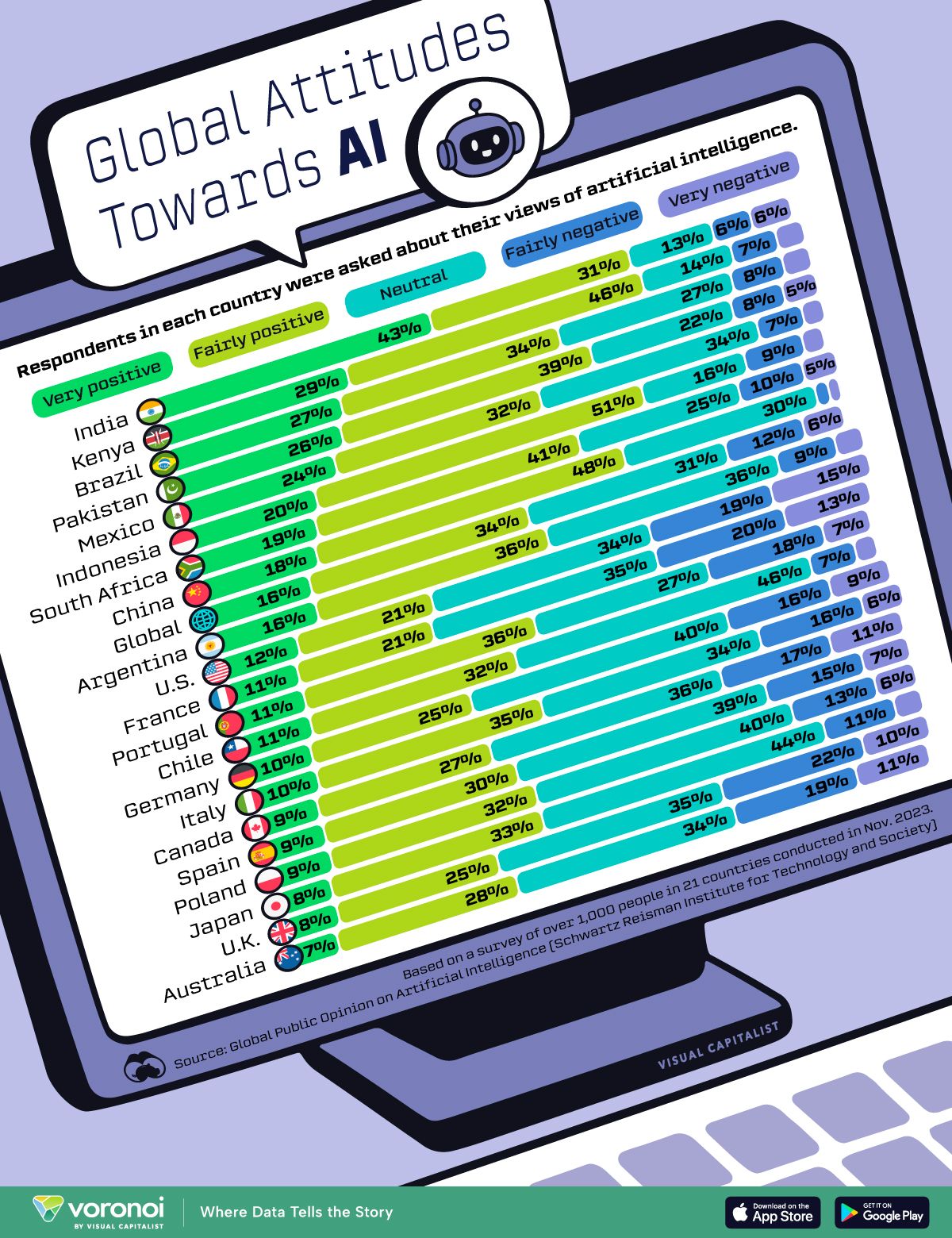Introduction
Public attitudes toward artificial intelligence vary widely: a 21-country survey uncovers stronger optimism in several emerging economies and greater neutrality or skepticism in many advanced nations.
Context
The visualization and figures derive from the Global Public Opinion on Artificial Intelligence (GPO-AI) survey by the Schwartz Reisman Institute for Technology and Society, with over 1,000 respondents per country. Participants rated AI from "very positive" to "very negative", enabling cross-country comparison of sentiment.
Key findings
Emerging economies lead in optimism: India reports 43% "very positive", followed by Kenya at 29% and Brazil at 27%. Globally, 16% of respondents are "very positive" and 34% "fairly positive".
Advanced economies often show neutral sentiment: the U.S. records 34% neutral, Japan 44% neutral, and Germany 40% neutral, suggesting caution linked to ongoing public debates on AI ethics and regulation.
Negative views are more prominent in some Western countries: the U.S., France and Australia register comparatively higher shares of "fairly" and "very negative" responses, reflecting concerns about misinformation, job displacement and other societal risks.
Explaining the differences
Emerging vs advanced economies
In many emerging markets, AI is perceived as a driver of economic growth, public-service improvement and job opportunities, which helps explain higher positive responses. In advanced economies, greater public scrutiny appears to temper enthusiasm.
National patterns
China stands out for a high share of "fairly positive" responses (48%), while Italy and Spain show notable neutral majorities (Italy 34% neutral; Spain 39% neutral), indicating that cultural and institutional contexts shape AI perceptions.
Practical implications
- Policy makers should tailor regulation and public messaging to national sentiment and concerns.
- Businesses need trust-building measures and targeted communication to increase acceptance in cautious markets.
- Researchers should link public perceptions to measurable outcomes to better inform expectations.
Limitations
The survey reflects self-reported opinions at the time of data collection and does not directly measure economic impacts or future shifts in sentiment.
FAQ
What is the data source for public attitudes toward artificial intelligence?
The data come from the Global Public Opinion on Artificial Intelligence (GPO-AI) survey by the Schwartz Reisman Institute for Technology and Society.
Which countries show the highest optimism toward AI?
India (43% "very positive"), Kenya (29%) and Brazil (27%) have the largest shares of very positive views.
Why do advanced economies often show neutral sentiment toward AI?
Neutrality likely reflects more extensive public discussion on ethics, regulation and potential job impacts in those countries.
Where are negative attitudes toward AI more common?
Negative attitudes are comparatively higher in the U.S., France and Australia, indicating heightened concerns about societal risks.
How should businesses respond to differing public attitudes toward artificial intelligence?
Adopt clear communication, stakeholder engagement and upskilling initiatives to address local concerns and build trust.
Conclusion
The 21-country survey reveals diverse public perspectives on AI: optimism concentrates in emerging economies, while neutrality and skepticism prevail in many advanced nations. Tailored public policy, corporate strategy and research are essential to address these variations and align AI deployment with social expectations.
